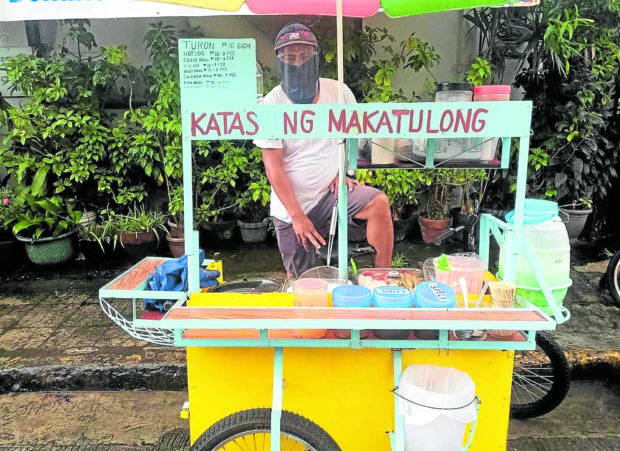
SIGN OF GRATITUDE As a subtle nod to the origin of his new source of income, former welder turned fish ball cart owner Mario Lutang has hanged a “Katas ng Makatulong” sign on his cart. —PHOTO FROM MAYOR ABBY BINAY’S TWITTER POST
MANILA, Philippines — Using the cash assistance he got from the Makati City government, a 42-year-old welder — one of the many who lost their jobs due to the new coronavirus disease (COVID-19) — built a cart and started selling street food.
According to Mario Lutang, a resident of Barangay Valenzuela, he has been earning around P500 to P600 a day since he started selling fish balls, “kikiam,” hotdogs, squid balls and juice drinks on July 15.
He said he took on different jobs when he was laid off from work in March after Metro Manila was placed on lockdown.
In May, the Makati City government launched its Makatulong 5K economic relief program to help residents affected by COVID-19. Lutang and his wife, Veronica, were among the 500,000 beneficiaries who received P5,000 each.
Built with own hands
To ensure a regular source of income for his family, Lutang decided to invest his share in a food cart which he built with his own hands. He then borrowed P1,000 from his wife to buy the street food they would sell to customers.
Lutang said he was thankful to the city government because the Makatulong program gave him and his family “a fresh start and a chance to survive” amid the pandemic.
“We should work hard and not give up hope,” he added.
In a Twitter post, Mayor Abby Binay praised Lutang, saying she was humbled and amazed by his determination and perseverance.
“He had the foresight to use the city’s cash assistance to generate sustainable income for him and his family. On behalf of the city government, we applaud you. Thank you for serving as an example of hope and resilience to all of us. You are truly a model #Proudmakatizen,” she said.
Lutang attributed the turn of events to hard work, optimism and luck as his case was different from those of millions of Filipinos months into the pandemic.
A Social Weather Stations survey said that 45.5 percent of the labor force or equivalent to 27.3 million Filipinos, were unemployed in July as the country plunged into a recession.
According to a study by the Philippine Institute for Development Studies, the number of Filipinos in poverty may reach 1.5 million because of joblessness and economic contraction caused by the coronavirus. The figure may rise further to 5.5 million without the social amelioration program and wage subsidy for micro, small and medium-sized enterprises.
The state-run think tank urged the government “[to] ultimately ensure that the poor are at the center of policy attention, especially given all the reduced economic activities from COVID-19 and the likely undercounts of COVID-19 infection among the poor, who do not have the luxury to seek health care.”